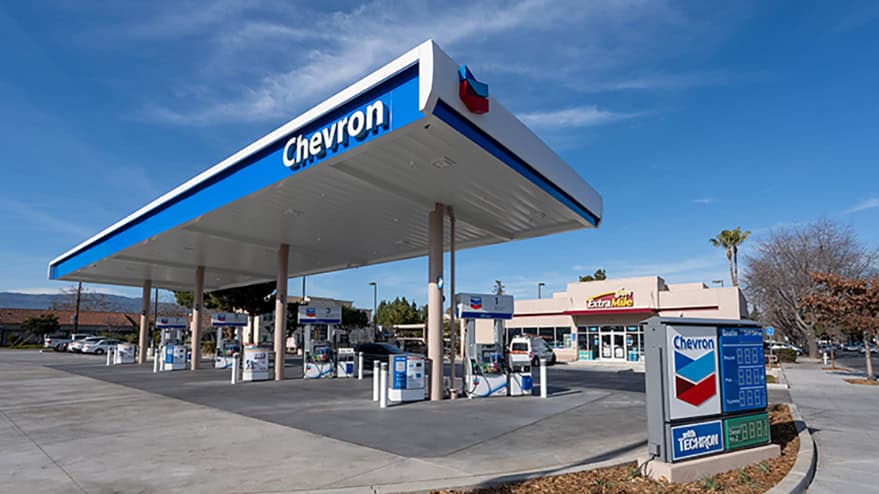The oil giant is buying a majority stake in the world’s largest hydrogen production and storage facility.
Clean hydrogen could be the game changer the world needs to help decarbonize heavy industries like steel, chemicals, aviation, and shipping. The lower-emissions fuel could replace natural gas and other fossil fuels to help power those industries.
Because of that, it has enormous market potential. Deloitte sees the fuel surpassing liquified natural gas (LNG) in value by 2030 and growing into a $1.4 trillion annual market by 2050.
Chevron (CVX 0.62%) is taking a notable step toward capturing the massive potential in hydrogen with its recent agreement to acquire a majority stake in the world’s largest green-hydrogen production and storage facility.
It’s one of many investments the company is making in hydrogen and other lower-carbon opportunities as it works to capitalize on the energy transition away from fossil fuels.
A bold bet on hydrogen
Chevron has agreed to acquire 100% of Magnum Development. It will receive a 78% interest in ACES Delta, a joint venture with Mitsubishi Power America, to develop the Advanced Clean Energy Storage Project in Utah.
The ACES project plans to use renewable energy to turn water into hydrogen through electrolysis. It would then store the fuel in two underground salt caverns until needed.
The first project would produce and store up to 100 metric tons of hydrogen per day. It’s currently under construction and on track to begin commercial operations in mid-2025. The project received a $504 million loan guarantee from the U.S. Department of Energy last year to help fund it.
Mitsubishi Power is building a turbine to use the stored hydrogen to produce electricity. The 840-megawatt (MW) hybrid natural gas/hydrogen plant would use hydrogen to produce up to 300 MW of electricity to help stabilize the power grid in the western part of the country during periods of lower production of wind and solar power. It will replace a 1.8-gigawatt coal-fired plant that’s being retired.
Growing its lower-carbon business one investment at a time
Chevron’s investment in ACES Delta provides it with a future growth platform. It sees the potential to develop similar projects that could produce hydrogen for several uses, including power generation, heavy-duty transportation fuel, and as a replacement for fossil-fuel-based hydrogen at its refineries.
It’s part of the company’s plan to invest $10 billion in lower-carbon opportunities through 2028, a multipronged approach including renewable natural gas, renewable fuels, hydrogen, and carbon capture and storage. Chevron made its most notable lower-carbon investment last year when it bought Renewable Fuels Group for $3.2 billion to become the second-largest bio-renewable diesel producer in the country.
The company sees tremendous opportunities in more hydrogen projects. CEO Mike Wirth said on the company’s second-quarter earnings call that it’s working on opportunities in “both electrolytic hydrogen and then traditional hydrogen paired with carbon capture and storage (CCS).”
Wirth said that the Inflation Reduction Act contained incentives supporting hydrogen developments. The company is in the early stages of developing hydrogen hubs paired with CCS in the Gulf Coast region and green hydrogen projects in California. It invested in Raven SR earlier this year, which is working to commercialize the operations of its green waste-to-hydrogen facility in California.
Chevron’s hydrogen investments to capture what could become a large and growing market opportunity for lower-carbon fuel might more than offset a future decline in its legacy oil and gas business as the world switches to lower-carbon energy.
A potentially meaningful investment
Chevron’s majority stake in what will be the country’s largest hydrogen production and storage facility could be a blueprint for other investments in the space. Its lower-carbon strategy could pay off for investors in the long run, making it a more attractive investment in the energy sector during its transition.
Don’t miss this second chance at a potentially lucrative opportunity
Ever feel like you missed the boat in buying the most successful stocks? Then you’ll want to hear this.
On rare occasions, our expert team of analysts issues a “Double Down” stock recommendation for companies that are about to pop. If you’re worried you’ve already missed your chance to invest, now is the best time to buy before it’s too late. And the numbers speak for themselves:
- Netflix: up more than 235x* since we doubled down in 2004
- Amazon: up more than 14x* since we doubled down in 2010
- Apple: up more than 34x* since we doubled down in 2008
Right now, we’re issuing “Double Down” alerts for three incredible companies, and there may not be another chance like this anytime soon.

